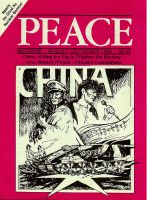
Peace Magazine Aug-Sep 1989, page 30. Some rights reserved.
Search for other articles by John McMurtry here
Is the expression "fight for peace" an embarrassing metaphor?
People in the peace movement also make war: They fight to eradicate nuclear weapons. They organize campaigns of attack against arms build ups and foreign aggressions. They battle for a world free of mass-murder weapons of any kind. They are, at best, tireless warriors against the myths that maintain the social death-threat.
But there seems to be something self-confuting in fighting for peace, so we pass it off as metaphor and don't think about the paradox it poses to us. We've seen too often how the battle for a higher good can get corrupted by the demands of the battle itself. Aggression breeds aggression, attack engenders attack, and the hostility escalates until we are back at mass-homicide methods again on behalf of what everyone claims is the higher good.
The very title "peace movement" declares a repudiation of its deadly spiral. But we are left in a quandary. Is any willingness to fight a betrayal of the movement? Do we have to purge our thoughts and souls of all combative will to remain true to our cause? Is a heart that truly loves peace one which cannot wage war?
In a recent book, Understanding War, I argue that the answer to this riddle is not to reject war, but rather to reject the pathological military form of war. This form of war, imposed on populations by the ruling interests of relatively few, is the real problem. Many forms of war are required to survive as a species. In the strict sense of the term, we wage war against AIDS, cancer, corruption, pollution, and official lies. We organize ourselves to conquer and to eradicate them. Now we must direct our war-making capabilities, distinctive to our species, against a rogue institution of social power.
This enemy is not a form of life, but a way of imposing death. The military form of war is the basic maladaptation of our species; it needs to be fought and vanquished. But since it is linked to powerful economic and political interests, its extinction will require a sustained campaign of elimination.
It is facile to call this a war only in "metaphor." A symptom of military power in our culture is the extent to which it has appropriated even our language itself - war must be military war, security must be military security, defence must be military defence, and so on. Thus meaning itself is surrendered to the military monopoly, leaving us no way of fighting back, lest we fall into the "same old aggressive pattern." This is confusion leading to impotence. The military-industrial complex could hardly hope for a more acquiescent response to its program. Make no mistake about it: Enormously powerful interests are involved here. Even Gandhi knew in facing these interests that "it is a fight to the finish." The paradox of "fighting for peace" is resolved by the recognition that fights can not only be destructive of life, they can be against the destruction of life.
The peace movement is a fighting movement, and needs to recognize this for its own effectiveness and integrity. In a superb recent special issue of PEACE Magazine on Religion and Peace, I gathered together the lines of a battle hymn that sang forth from almost every page. "Struggle," "take a stand," "unarmed war," "audacity," "battle for justice," "battle for liberation," "weapons of the spirit," "civilian defence," "warriors for peace," "fighting for human rights," "destroy and eliminate an entire class of weapons."
This is the language of war - a war against the destruction of planetary life by the military institution. The enemy is a system of production and distribution that feeds on life and life resources to keep itself growing on the social body. The battle against this pathological growth reaches into the structure of our own social orders themselves. The peace it seeks is the end of technologies whose purpose is the death and maiming of human beings.
John McMurtry is a philosophy professor at the University of Guelph. His book, Understanding War, was published by Samuel Stevens in Toronto this year for Science for Peace.

Peace Magazine Aug-Sep 1989, page 30. Some rights reserved.
Search for other articles by John McMurtry here